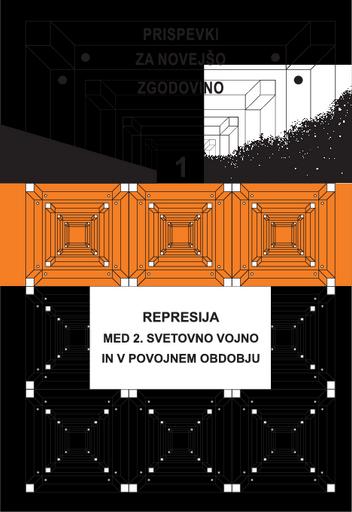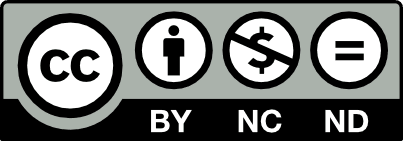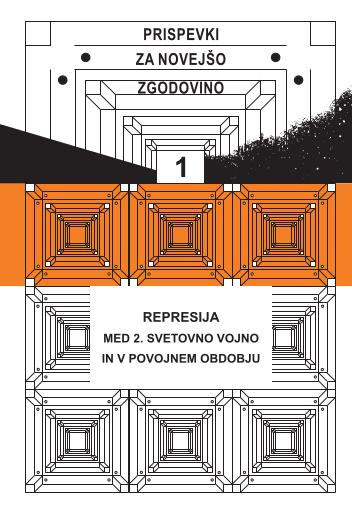
/
Periodicals
/
Prispevki za novejšo zgodovino
Crime and Punishment : Punishment of Crime in the Yugoslav Legislation 1945–1963

Author(s):Zdenko Čepič
Co-author(s):Zdenko Čepič (odg. ur.), Damijan Guštin (gl. ur.), Borut Praper (prev.), Bojana Samarin (lekt.)
Leto:2013
Publisher(s):Inštitut za novejšo zgodovino, Ljubljana
Language(s):slovenščina
Type(s) of material:text
Keywords:Slovenija, represija, zakonodaja, zločin, kaznovanje, nepolitična kazniva dejanja, Slovenia, repression, legislation, crime, punishment, non‑political criminal offences
Rights:

This work by Zdenko Čepič is licensed under Creative Commons Attribution-NonCommercial-NoDerivs 4.0 International
Files (1)

Name:Prispevki_za_novejso_zgodovino_2013-1.pdf
Size:4.13MB
Format:application/pdf
Permanent link:https://hdl.handle.net/11686/file18345
Description
We usually understand repression carried out within or by a state or its authorities as violence against the political opponents of the authorities. Regardless of the political system in Slovenia and Yugoslavia after World War II, where the power was taken over by the communists, who persecuted political crimes (according to the criminal code, crimes against »the people and the state«) very resolutely especially in the first years after the war in order to strengthen and affirm their authority (which is usually deemed as repression), the majority of the crimes (criminal offences) committed consisted of »ordinary« crimes – murder, manslaughter, theft, falsifications, etc. The state authorities punished these crimes through the judicial system. Crime is usually followed by punishment. Non‑political criminal offences far outnumbered political crimes. On the basis of the legislation and statistical information, the author describes the extent of »crime and punishment«.
Metadata (12)
- identifierhttps://hdl.handle.net/11686/34920
- title
- Zločin in kazen: kaznovanje zločina v jugoslovanski zakonodaji 1945−1963
- Crime and Punishment : Punishment of Crime in the Yugoslav Legislation 1945–1963
- creator
- Zdenko Čepič
- contributor
- Zdenko Čepič (odg. ur.)
- Damijan Guštin (gl. ur.)
- Borut Praper (prev.)
- Bojana Samarin (lekt.)
- subject
- Slovenija
- represija
- zakonodaja
- zločin
- kaznovanje
- nepolitična kazniva dejanja
- Slovenia
- repression
- legislation
- crime
- punishment
- non‑political criminal offences
- description
- Represijo v državi ali represijo države oziroma njene oblasti razumemo običajno predvsem kot nasilje nad političnimi nasprotniki oblasti. Ne glede na politični sistem v Sloveniji/Jugoslaviji po 2. svetovno vojni, v katerem so imeli oblast komunisti, ki so za utrjevanje in potrjevanje svoje oblasti zlasti v prvih letih po koncu vojne zelo odločno preganjali politične zločine (po kazenskem zakoniku zločine proti »ljudstvu in državi«), kar se običajno razume kot represija, so med storjenimi zločini (kriminalnimi dejanji) prevladovala »navadna« kazniva dejanja, od ubojev, umorov, kraj, poneverb itd. Državna oblast je to prek sodnega sistema kaznovala. Storjenemu zločinu običajno sledi kazen. Kaznivih dejanj, ki niso bila označena kot politična, je bilo veliko več kot političnih. Avtor na osnovi zakonodaje in statističnih podatkov prikazuje obseg »zločina in kazni«.
- We usually understand repression carried out within or by a state or its authorities as violence against the political opponents of the authorities. Regardless of the political system in Slovenia and Yugoslavia after World War II, where the power was taken over by the communists, who persecuted political crimes (according to the criminal code, crimes against »the people and the state«) very resolutely especially in the first years after the war in order to strengthen and affirm their authority (which is usually deemed as repression), the majority of the crimes (criminal offences) committed consisted of »ordinary« crimes – murder, manslaughter, theft, falsifications, etc. The state authorities punished these crimes through the judicial system. Crime is usually followed by punishment. Non‑political criminal offences far outnumbered political crimes. On the basis of the legislation and statistical information, the author describes the extent of »crime and punishment«.
- publisher
- Inštitut za novejšo zgodovino
- date
- 2013
- type
- besedilo
- language
- Slovenščina
- isPartOf
- rights
- license: ccByNcNd
Citirano v (1)
| Tipologija | Avtor(ji) | Naslov | Kraj | Založba | Leto |
|---|---|---|---|---|---|
| 2.01 Znanstvena monografija | Koncilija, Žiga | Politično sodstvo : sodni procesi na Slovenskem v dveh Jugoslavijah | Ljubljana | Inštitut za novejšo zgodovino | 2015 |
Seznam literature v delu (3)
| Stran | Avtor | Naslov | Vir | Kraj | Založba | Leto |
|---|---|---|---|---|---|---|
| 303 | Režek, Mateja | Neodvisnost sodstva na preizkušnji : pravosodje in sistem politične kazenske represije v Jugoslaviji (1948−1959) | Zgodovina za vse | 2002 | ||
| 307 | Kobe, Peter | Kazensko pravni sistem, organi kazenskega pregona in pravosodja v času dachauskih procesov | Dachauski procesi | Ljubljana | 1990 | |
| 308 | Bavcon, Ljubo | Kaznenopravna zaštita države i njenog uređenja : politički delikti | Zagreb | 1988 |